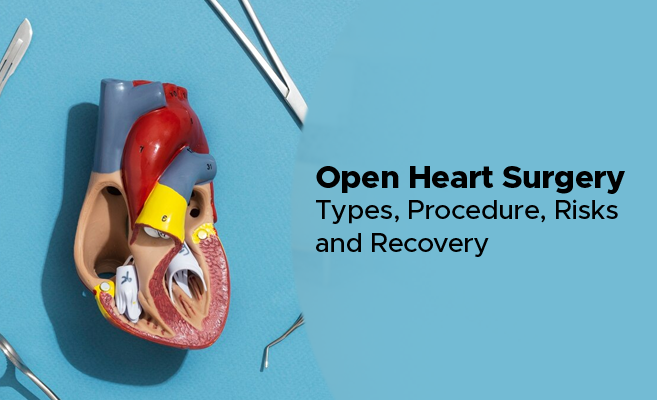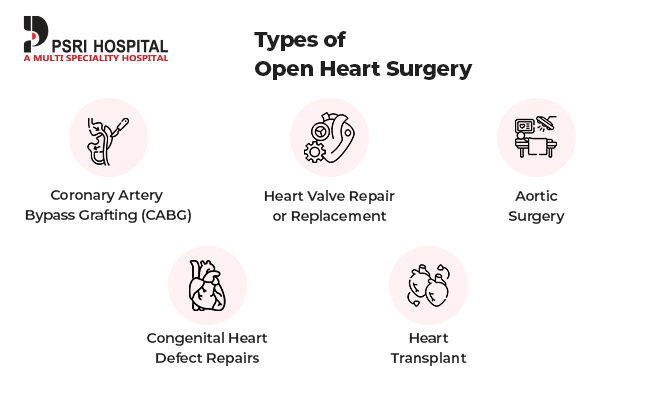Open Heart Surgery: Types, Procedure, Risks and Recovery

Open heart surgery is a critical procedure used to treat various heart conditions that cannot be managed with medication or less invasive treatments. When blood flow to the heart is severely compromised, it can lead to life-threatening conditions such as heart attacks, heart failure, or severe valve diseases. In these cases, open heart surgery becomes necessary to restore proper heart function and improve the patient’s quality of life. If you or a loved one has been advised to undergo open heart surgery, it is natural to have concerns and questions. In this blog, we will walk you through the types, procedures, risks, and recovery associated with open heart surgery, and why choosing the best cardiac surgeon in Delhi NCR is important for your health.

Types of Open Heart Surgery
Open heart surgery encompasses several types of procedures, each designed to address specific heart conditions. Here are the most common types of open-heart surgery:
Coronary Artery Bypass Grafting (CABG): This is the most common type of open heart surgery. It involves using a blood vessel graft to bypass blocked coronary arteries, restoring blood flow to the heart muscle.
Heart Valve Repair or Replacement: This procedure addresses problems with the heart valves, which regulate blood flow within the heart. Surgeons may repair or replace damaged valves with artificial ones.
Aortic Surgery: This includes procedures to repair or replace the aorta, the large artery that carries blood from the heart to the rest of the body. Aortic surgery is often required for aneurysms or dissections.
Congenital Heart Defect Repairs: These surgeries correct structural problems present at birth. The type of surgery depends on the specific defect and its severity.
Heart Transplant: In severe cases of heart failure where other treatments have failed, a heart transplant may be necessary. This involves replacing the diseased heart with a healthy donor heart.
The Procedure of Open Heart Surgery
The open heart surgery procedure generally involves several important steps:
Preparation: Before the surgery, the patient undergoes a series of tests including blood tests, chest X-rays, and electrocardiograms (ECG). These tests help the surgical team assess the patient’s overall health and plan the surgery.
Anesthesia: The patient is placed under general anesthesia, ensuring they are asleep and pain-free throughout the procedure.
Incision: The surgeon makes an incision in the chest, typically along the breastbone, to access the heart. The breastbone is then separated to open the chest cavity.
Heart-Lung Machine: During the surgery, the patient’s blood is diverted to a heart-lung machine, which takes over the function of the heart and lungs. This allows the surgeon to operate on a still heart.
Surgical Procedure: Depending on the type of surgery, the surgeon performs the necessary repairs or replacements. This could involve grafting a new blood vessel, repairing a valve, or replacing the heart.
Closing the Chest: Once the procedure is complete, the heart-lung machine is gradually withdrawn as the heart resumes its function. The breastbone is wired back together, and the incision is closed with stitches.
Recovery Room: After the surgery, the patient is moved to the recovery room for monitoring. They are then transferred to the Intensive Care Unit (ICU) for further observation.
Risks Involved in Open Heart Surgery
While open-heart surgery survival rate is higher, it also carries certain risks. Understanding these risks can help patients and their families prepare better:
Infection: There is a risk of infection at the incision site or in the lungs, heart, or urinary tract.
Bleeding: Excessive bleeding during or after the surgery may require additional procedures.
Stroke: Blood clots can form and travel to the brain, causing a stroke.
Heart Attack: Though rare, the heart can suffer damage during the procedure.
Lung Problems: Postoperative lung complications can arise, especially in patients with pre-existing lung conditions.
Kidney Failure: Temporary or permanent kidney failure can occur, particularly in older patients or those with existing kidney issues.
Arrhythmias: Irregular heartbeats can develop, which might need medication or additional treatment.
Recovery and Aftercare
Recovery from open heart surgery is a gradual process and requires careful attention to aftercare:
Hospital Stay: Most patients stay in the hospital for about a week, with the initial few days spent in the ICU.
Pain Management: Pain is managed with medications. Patients are encouraged to follow their doctor’s instructions regarding pain relief.
Wound Care: Keeping the incision site clean and dry is crucial to prevent infection. Follow the care instructions provided by the healthcare team.
Activity Levels: Patients are advised to start with light activities and gradually increase their activity level. Avoid heavy lifting or strenuous activities until the doctor gives the go-ahead.
Diet and Lifestyle: A heart-healthy diet, regular exercise, quitting smoking, and managing stress are essential for recovery and preventing future heart problems.
Follow-Up Appointments: Regular check-ups with the cardiologist are crucial to monitor the patient’s recovery and address any complications.
Cardiac Rehabilitation: Many patients benefit from a structured cardiac rehabilitation program, which includes supervised exercise, education, and counseling.
PSRI Hospital Provides the Best Treatments and Care
Open heart surgery is a significant procedure that requires the expertise of experienced cardiac surgeons and comprehensive post-operative care. At PSRI Hospital, we are dedicated to providing the highest quality of care to our patients at a budgeted open heart surgery cost. If you are searching for the ‘top cardiologist near me’, our team of the best cardiac surgeons ensures that you receive personalized and effective treatment. Whether you are looking for a cardiologist doctor near me or need expert cardiac care, trust PSRI Hospital to provide the best treatments and support every step of the way.
FAQs
Q: What is open heart surgery?
Ans: Open heart surgery is a procedure where surgeons make an incision in the chest to operate directly on the heart to fix serious heart conditions.
Q: What are the types of open heart surgery?
Ans: The main types include Coronary Artery Bypass Grafting (CABG), heart valve repair or replacement, aortic surgery, congenital heart defect repairs, and heart transplants.
Q: What are the risks of open heart surgery?
Ans: Risks include infection, bleeding, stroke, heart attack, lung problems, kidney failure, and irregular heartbeats.
Q: How long is the recovery period after open heart surgery?
Ans: Recovery usually involves a week in the hospital, with gradual increase in activity over several weeks, and regular follow-up appointments with the doctor.

 Book An Appointment
Book An Appointment Virtual Consultation
Virtual Consultation





